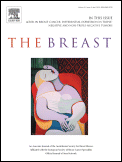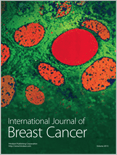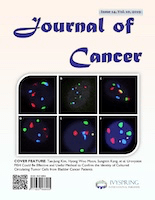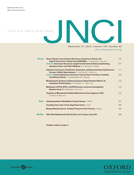
BREAST
Scope & Guideline
Fostering collaboration for improved patient outcomes.
Introduction
Aims and Scopes
- Clinical Research and Trials:
The journal publishes original research articles detailing clinical trials, including phase I, II, and III studies, evaluating the efficacy and safety of new therapies, including chemotherapy, targeted therapy, and immunotherapy for breast cancer. - Diagnostic Techniques and Imaging:
Research focusing on advancements in diagnostic imaging techniques such as mammography, MRI, and PET scans, as well as the development and validation of new diagnostic tools and biomarkers for early detection and monitoring. - Surgical Techniques and Oncoplastic Surgery:
Studies exploring various surgical interventions for breast cancer, including mastectomy, breast-conserving surgery, and oncoplastic techniques, emphasizing outcomes, complications, and innovations in surgical practice. - Patient-Centered Outcomes and Quality of Life:
The journal emphasizes research on quality of life, patient-reported outcomes, and the psychosocial aspects of breast cancer treatment, aiming to improve patient care and support. - Epidemiology and Health Disparities:
Articles addressing the epidemiology of breast cancer, risk factors, and disparities in access to care and treatment outcomes among different populations. - Multidisciplinary Approaches and Care Models:
Research on the integration of multidisciplinary approaches in managing breast cancer, including collaboration between oncologists, surgeons, radiologists, and nurses to enhance patient outcomes. - Innovative Therapies and Molecular Biology:
Focus on the molecular and genetic basis of breast cancer, including studies on targeted therapies, genetic testing, and personalized medicine approaches. - Survivorship and Long-term Outcomes:
Studies evaluating the long-term effects of breast cancer treatment, survivorship issues, and strategies to improve the health and well-being of breast cancer survivors.
Trending and Emerging
- Personalized Medicine and Genomic Testing:
There is a marked increase in research focusing on personalized medicine, including genomic testing and biomarker-driven therapies, which aim to tailor treatment strategies to individual patients. - Immunotherapy and Targeted Therapies:
Emerging studies on immunotherapy and targeted therapies are gaining traction, reflecting a shift towards leveraging the immune system and specific molecular targets in breast cancer treatment. - Telemedicine and Remote Patient Monitoring:
The COVID-19 pandemic has accelerated research into telemedicine and remote monitoring solutions for breast cancer patients, emphasizing the need for accessible care and follow-up. - Long-term Survivorship and Quality of Life:
There is a growing emphasis on the long-term survivorship experience, focusing on quality of life, psychosocial support, and addressing the needs of breast cancer survivors. - Health Disparities and Access to Care:
Research addressing health disparities in breast cancer care, including access to treatment and outcomes among underrepresented populations, is increasingly prominent. - Advanced Imaging Techniques and AI Integration:
Innovations in imaging techniques, including the use of artificial intelligence for better diagnostic accuracy and treatment planning, are emerging as a significant area of interest. - Oncoplasty and Reconstruction Techniques:
Research into oncoplastic surgery and innovative reconstruction techniques is trending, highlighting the importance of aesthetics and function in breast cancer surgery. - Patient-Centric Approaches in Treatment Decisions:
An increasing focus on patient preferences and shared decision-making in treatment planning is emerging, reflecting a shift towards more patient-centered care models.
Declining or Waning
- Traditional Chemotherapy Approaches:
There has been a noticeable decline in studies focusing solely on traditional chemotherapy regimens, as the field shifts towards targeted therapies and personalized medicine approaches. - Standardized Surgical Protocols:
Research on standardized surgical approaches, such as conventional mastectomy without considering personalized techniques, is less prevalent as oncoplastic and individualized surgical methods gain prominence. - Generalized Risk Factors without Stratification:
Studies that broadly address risk factors for breast cancer without stratifying by molecular subtypes or genetic predisposition are becoming less common, reflecting a shift towards more nuanced research. - Basic Epidemiological Studies:
Basic epidemiological studies that do not incorporate advanced methodologies or new insights into breast cancer biology are seeing reduced publication rates, as more complex analyses gain favor. - Non-Molecular Predictive Markers:
Research focusing on non-molecular or traditional predictive markers for treatment response is declining, as the field increasingly emphasizes genomic and molecular profiling.
Similar Journals

Cancers
Transforming cancer knowledge into impactful solutions.Cancers is a leading peer-reviewed journal published by MDPI, dedicated to advancing the field of oncology and cancer research. Established in 2009 and based in Switzerland, this Open Access journal provides a platform for the rapid dissemination of high-quality research findings, reviews, and clinical studies related to all aspects of cancer biology and treatment. With an impressive impact factor and recognized as Q1 in Oncology and Q2 in Cancer Research for 2023, Cancers strives to foster a collaborative environment among researchers, healthcare professionals, and students seeking to deepen their knowledge and understanding of cancer. The journal’s commitment to accessibility and its broad scope make it an invaluable resource for anyone passionate about combating cancer and improving patient outcomes. For more information and to access its diverse publications, visit the journal’s website.

International Journal of Breast Cancer
Advancing breast cancer research for a healthier tomorrow.The International Journal of Breast Cancer is a premier academic platform dedicated to advancing the field of breast cancer research and treatment. Published by HINDAWI LTD, this journal embraces an Open Access model since 2011, ensuring that cutting-edge research is readily accessible to all, facilitating the dissemination of knowledge across the global scientific community. With its ISSN 2090-3170 and E-ISSN 2090-3189, the journal caters to a diverse audience comprising researchers, clinicians, and students engaged in oncology and pharmacology. The journal has consistently demonstrated its relevance, classified in the Q4 quartile for Cancer Research and the Q3 quartile for both Oncology and Pharmacology in the latest rankings. It currently ranks #151/272 in the Medicine & Pharmacology category and #232/404 in Medicine & Oncology according to Scopus, showcasing its adaptive role in an evolving field. Commencing in 2013 and continuing through to 2024, the journal is positioned to be an essential resource, addressing critical topics and fostering innovative solutions for breast cancer challenges.

BRITISH JOURNAL OF CANCER
Shaping the Future of Oncology Through Quality Scholarship.The British Journal of Cancer, published by SpringerNature, stands as a preeminent resource in the fields of Cancer Research and Oncology, with a distinguished history of publication dating back to 1947. With its Q1 rank in both categories for 2023, this journal is among the top-tier publications, offering cutting-edge research and insights into the biology, etiology, and treatment of cancer. The journal’s rigorous peer-review process ensures that readers are presented with high-quality studies that contribute to the advancement of cancer knowledge and clinical practice. Operating from the United Kingdom, it has garnered a notable impact factor and ranks impressively within Scopus, making it an essential publication for researchers, healthcare professionals, and students who are dedicated to understanding cancer's complexities. Access to the journal's articles is available in traditional formats, providing a versatile platform for disseminating pivotal research. As we move towards a future where cancer treatment and prevention remain crucial, the British Journal of Cancer continues to play a vital role in shaping the dialogue and discoveries within the oncology community.

Indian Journal of Surgical Oncology
Illuminating the Path of Surgical Oncology AdvancementThe Indian Journal of Surgical Oncology, published by SPRINGER INDIA, is a vital source of scholarly research and discourse in the fields of oncology and surgery. Since its inception in 2010, the journal has been dedicated to advancing the science and practice of surgical oncology, providing a platform for researchers, clinicians, and educators to disseminate their findings and insights. With an increasing impact factor, the journal currently ranks in the Q4 category in Oncology and Q3 category in Surgery, reflecting its growing influence in the academic community. The journal maintains a focus on high-quality research, clinical studies, and innovative surgical techniques, fostering knowledge exchange among professionals in India and beyond. Although an open access option is not provided, the journal remains an essential repository of information for anyone engaged in the rapidly evolving fields of surgical oncology. For access to groundbreaking research and updates in the discipline, the Indian Journal of Surgical Oncology continues to be an indispensable resource.

Journal of Cancer
Championing open access to vital cancer research.Journal of Cancer is a premier, peer-reviewed academic journal published by IVYSPRING INTERNATIONAL PUBLISHING that focuses on advancing the field of oncology. With an impact factor reflecting its significant contributions, this journal ranks in the 80th percentile of medical journals pertaining to oncology, positioning it at #79 out of 404 in Scopus. Since its inception in 2010, the journal has embraced an Open Access model, ensuring that groundbreaking research reaches a global audience without barriers. Based in Australia, the journal addresses a wide array of topics within cancer research, catering to researchers, healthcare professionals, and students committed to enhancing their understanding of the complexities of cancer. Amidst evolving challenges in oncology, the Journal of Cancer serves as a vital platform for disseminating innovative findings, fostering collaboration, and promoting informed decisions that can lead to improved cancer outcomes worldwide.

JOURNAL OF CANCER RESEARCH AND CLINICAL ONCOLOGY
Connecting Research and Practice in the Fight Against Cancer.JOURNAL OF CANCER RESEARCH AND CLINICAL ONCOLOGY, published by Springer, is a prestigious peer-reviewed journal dedicated to advancing the fields of cancer research and clinical oncology. With an impact factor reflecting its significance within the academic community, the journal operates under a rigorous quality standard and offers a wealth of knowledge spanning from 1979 and continuing through 2025. With its comprehensive scope, it encompasses a wide array of topics including novel therapeutic strategies, clinical trials, and cutting-edge research methodologies, making it an essential resource for researchers, practitioners, and students alike. The journal’s category quartiles highlight its competitive edge, ranking Q2 in Cancer Research and Q1 in Medicine (miscellaneous) as of 2023. This positioning underscores its role at the forefront of oncology discourse. Through this journal, contributors and readers alike engage with impactful research that informs clinical practices and enhances patient care in oncology. Access to the journal’s content, although not open access, ensures curated and high-quality insights available to the academic and professional community.

Breast Journal
Advancing breast health through innovative research.The Breast Journal, published by Wiley-Hindawi, is a distinguished Open Access journal dedicated to the fields of internal medicine, oncology, and surgery with a particular focus on breast health and disease. Since its inception in 1995, the journal has become an essential resource for researchers and clinicians, facilitating the dissemination of high-quality research and innovative clinical practices. With an impact factor reflecting robust scholarly influence and a ranking in the Q3 quartile for both internal medicine and oncology, as well as Q2 in surgery, it showcases significant contributions that advance knowledge and improve patient outcomes. Offering unparalleled access to its articles, The Breast Journal aims to support a global audience in exploring the multifaceted challenges and breakthroughs in breast-related health, making it a vital platform for shared learning and scientific discourse.

Current Breast Cancer Reports
Pioneering Knowledge for Better Breast Cancer Outcomes.Current Breast Cancer Reports is a vital academic journal published by Springer that focuses on the latest research and advancements in the field of breast cancer. With its ISSN 1943-4588 and E-ISSN 1943-4596, this journal serves as an essential resource for oncologists, researchers, and healthcare professionals dedicated to improving diagnosis and treatment strategies for breast cancer. Spanning from 2009 to 2024, it provides a platform for high-quality, peer-reviewed articles that encompass a range of topics, including molecular biology, clinical trials, and innovative therapeutic approaches. Although it is currently classified in the Q3 category in Oncology and is positioned in the 29th percentile, the journal remains committed to elevating its academic impact and contributing meaningfully to the ongoing fight against breast cancer. As it seeks to disseminate critical findings and foster collaboration within the scientific community, Current Breast Cancer Reports is poised to be an indispensable tool for anyone keen on advancing the field.

JNCI-Journal of the National Cancer Institute
Advancing cancer research for a brighter tomorrow.JNCI-Journal of the National Cancer Institute, published by Oxford University Press Inc. in the United Kingdom, is a premier journal dedicated to advancing the field of cancer research and oncology. With a distinguished history dating back to 1940, this journal has consistently maintained a strong reputation within the academic community, achieving a remarkable Q1 ranking in both Cancer Research and Oncology as of 2023. Researchers and practitioners rely on the JNCI for original research articles, review papers, and cutting-edge findings that impact clinical practices and therapeutic strategies. Although it does not currently offer open access, the journal remains a vital resource for academicians and healthcare professionals seeking to enhance their understanding of cancer mechanisms and treatment innovations. Its rigorous peer-review process ensures the publication of high-quality, credible research that meets the evolving challenges of cancer treatment and prevention through to 2024.

Breast Cancer
Advancing knowledge in breast cancer research.Breast Cancer is a prestigious peer-reviewed journal published by SPRINGER JAPAN KK, specializing in the multifaceted domains of oncology and medical pharmacology. With an impressive impact factor and recognized within the Q1 category in multiple areas, including Medicine (miscellaneous), Radiology, and Nuclear Medicine and Imaging, this journal serves as a fundamental resource for cutting-edge research and clinical advancements in breast cancer treatment and care. Its indexed presence in renowned databases like Scopus further affirms its significance, ranking 56th in Radiology and 60th in Pharmacology. The journal aims to bridge the gap between clinical practice and scientific research by publishing original articles, reviews, and case studies that enhance understanding and improve patient outcomes. With converged content available from 1994 to 2024, the journal is dedicated to fostering innovative research while engaging a global audience of researchers, clinicians, and students passionate about tackling breast cancer challenges.